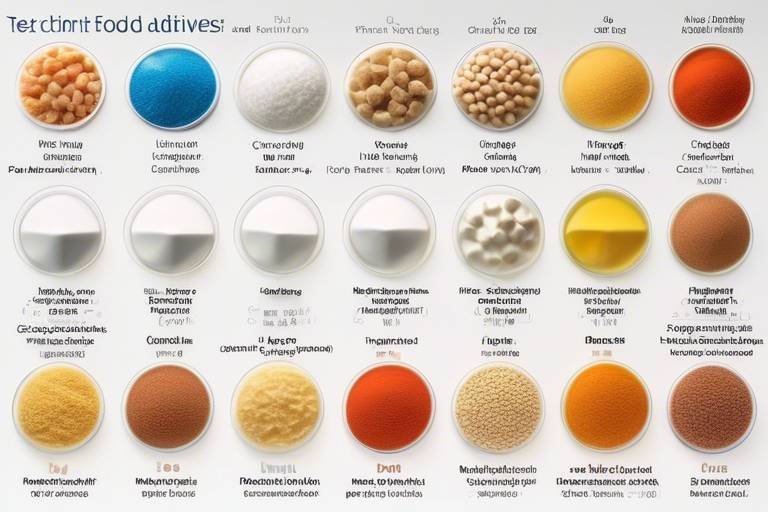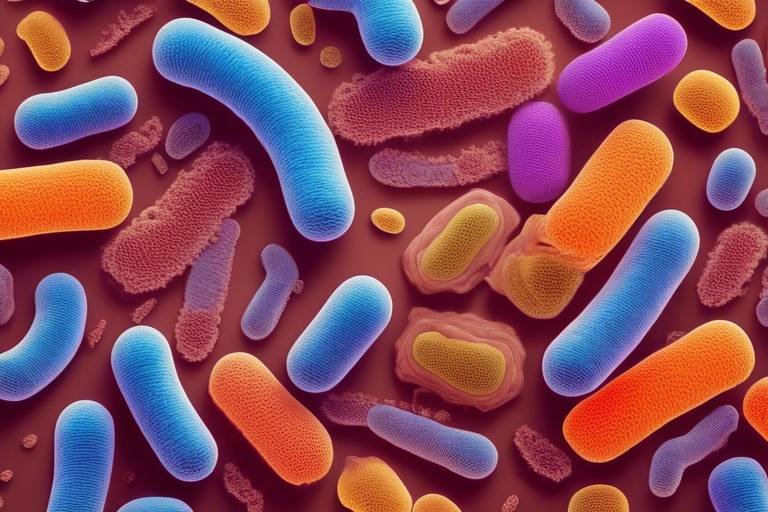The Biology of Microbiomes - Impact on Health
Have you ever thought about the tiny worlds that exist within your body? The microbiome is a bustling metropolis of microorganisms, including bacteria, fungi, and viruses, that call your body home. These tiny inhabitants play a monumental role in your overall health, influencing everything from digestion to immune function. In this article, we will explore the fascinating world of microbiomes, their biological functions, and their significant impact on human health. Buckle up, because the journey into the microscopic universe is both enlightening and crucial for understanding how we can optimize our well-being!
Microbiomes are not just random collections of microbes; they are complex communities that inhabit various environments, including our skin, mouth, and gut. Each microbiome is unique and shaped by numerous factors, including genetics, age, diet, and environment. The diversity of these microbial communities is essential for maintaining health. A rich variety of microorganisms can enhance our resilience against diseases, while a lack of diversity can lead to health issues.
In fact, studies have shown that a diverse microbiome can help in the prevention of various diseases. For example, the gut microbiome is rich in different species that help digest food, synthesize vitamins, and even produce short-chain fatty acids that benefit our health. The interplay between these microorganisms is a beautiful dance that keeps our bodies functioning optimally.
The development of microbiomes begins at birth, where the first microbes are introduced to our bodies. This initial exposure sets the stage for a lifelong relationship with these microorganisms. As we grow, various factors influence the diversity and stability of our microbiomes. These factors include:
- Genetics: Your genetic makeup can predispose you to certain microbial communities.
- Diet: What you eat significantly impacts the types of microbes that thrive in your gut.
- Environmental Exposure: The environment you live in, including pets and household cleanliness, can affect your microbiome.
This complex interplay of factors means that no two microbiomes are alike, making each person's microbial community as unique as a fingerprint.
When it comes to shaping our microbiomes, diet is a game-changer. The foods we consume directly influence the composition and function of our gut bacteria. For instance, a diet rich in fiber supports the growth of beneficial bacteria, while a diet high in processed foods can lead to an imbalance in microbial communities. Let's dive deeper into two dietary components that significantly affect our microbiomes: fiber and fermented foods.
Fiber is an unsung hero in the world of gut health. It serves as a vital nutrient for beneficial gut bacteria, acting as food that helps them thrive. When we consume fiber, it ferments in the gut, producing short-chain fatty acids that have numerous health benefits. Research shows that a high-fiber diet can:
- Enhance microbiome diversity.
- Improve digestion and prevent constipation.
- Reduce the risk of gastrointestinal diseases.
Incorporating a variety of fiber-rich foods such as fruits, vegetables, whole grains, and legumes can create a thriving environment for your gut bacteria.
Fermented foods are another powerhouse for enhancing microbiome diversity. Foods like yogurt, kimchi, and sauerkraut are rich in probiotics, which are live microorganisms that provide health benefits when consumed in adequate amounts. These foods can:
- Introduce beneficial bacteria into the gut.
- Support digestion and nutrient absorption.
- Boost the immune system.
Incorporating fermented foods into your diet is an easy and delicious way to support your microbiome and overall health.
Microbiomes play a crucial role in modulating the immune system. They help train our immune cells, ensuring that our bodies can distinguish between harmful pathogens and harmless substances. An imbalance in these microbial communities can lead to inappropriate immune responses, contributing to autoimmune diseases and allergies. For instance, research suggests that individuals with a less diverse microbiome may be more susceptible to conditions like asthma and inflammatory bowel disease.
The health of our microbiomes is intricately linked to the risk of various diseases. When the balance of microorganisms is disrupted, a condition known as dysbiosis occurs, which can lead to several health issues. For example, dysbiosis has been linked to obesity, diabetes, and inflammatory bowel disease. Understanding these connections can open new avenues for prevention and treatment.
Research indicates that microbiomes are involved in metabolic processes. Specific microbial profiles can influence how we digest food and store fat, potentially contributing to obesity and metabolic disorders. Some studies suggest that individuals with obesity have a different composition of gut bacteria compared to those with a healthy weight, highlighting the importance of maintaining a balanced microbiome for metabolic health.
Emerging studies suggest a surprising connection between microbiomes and mental health. The gut-brain axis is a fascinating area of research that explores how our gut health can influence our mood and cognitive function. For example, certain gut bacteria produce neurotransmitters like serotonin, which plays a crucial role in regulating mood. This connection suggests that maintaining a healthy microbiome could have positive effects on mental well-being.
1. What are microbiomes?
Microbiomes are communities of microorganisms, including bacteria, fungi, and viruses, that inhabit various environments, including the human body.
2. How do microbiomes affect health?
Microbiomes play essential roles in digestion, immune function, and even mental health. A balanced microbiome can help prevent diseases, while dysbiosis can lead to health issues.
3. Can diet influence microbiomes?
Yes! Diet significantly impacts the composition and function of microbiomes. Foods rich in fiber and fermented foods can promote a healthy microbiome.
4. What is dysbiosis?
Dysbiosis is an imbalance in the microbial communities in the body, which can lead to various health issues, including obesity and autoimmune diseases.
5. How can I improve my microbiome?
Incorporating a diet rich in fiber and fermented foods, along with maintaining a healthy lifestyle, can help improve your microbiome.

[Understanding Microbiomes]
This article explores the fascinating world of microbiomes, their biological functions, and their significant impact on human health, including disease prevention, immune response, and overall well-being.
Microbiomes are incredibly intricate communities of microorganisms that dwell in diverse environments, including our very own bodies. These tiny yet mighty organisms encompass bacteria, viruses, fungi, and even protozoa, forming a complex ecosystem that influences our health in profound ways. Imagine your body as a bustling city, with each microorganism playing a specific role, maintaining the balance of life. The composition of these microbiomes varies significantly from person to person, influenced by factors such as age, diet, and environment. In fact, the human microbiome is often referred to as a 'second genome' due to its significant role in our biological functions.
The diversity within a microbiome is crucial for its functionality. A healthy microbiome is often characterized by a rich variety of microorganisms, which can collectively perform essential tasks, such as digesting food, synthesizing vitamins, and protecting against harmful pathogens. On the flip side, a lack of diversity can lead to dysbiosis, a state where the balance of good and bad microbes is disrupted, potentially leading to various health issues. For instance, studies have shown that individuals with a more diverse microbiome tend to have better immune responses and lower risks of chronic diseases.
Microbiomes can be found in various locations within the human body, but the gut microbiome is the most extensively studied. This particular microbiome plays a pivotal role in digestion and nutrient absorption. The gut is home to trillions of microorganisms, and their interactions are essential for breaking down complex carbohydrates and producing short-chain fatty acids, which are beneficial for gut health. Furthermore, the gut microbiome communicates with our immune system, signaling it to respond appropriately to pathogens while maintaining tolerance to harmless substances.
Interestingly, microbiomes are not static; they evolve over time. From the moment of birth, we begin to acquire our unique microbial signature. Factors such as the mode of delivery (vaginal birth vs. cesarean section), breastfeeding, and even exposure to pets can shape our microbiome. As we grow, our diet and lifestyle choices further influence our microbial composition. For example, a diet rich in fruits, vegetables, and whole grains tends to promote a healthy microbiome, while a diet high in processed foods may lead to a decline in microbial diversity.
To summarize, understanding microbiomes is essential for recognizing their impact on our health. They are not merely passengers in our bodies; they are active participants in our biological processes. By nurturing our microbiomes through healthy lifestyle choices, we can foster a more balanced and diverse microbial community, leading to improved health outcomes.
- What are microbiomes? Microbiomes are communities of microorganisms that inhabit various environments, including the human body.
- How do microbiomes affect human health? They play crucial roles in digestion, immune response, and disease prevention.
- Can diet influence microbiome composition? Yes, dietary choices significantly affect the diversity and function of microbiomes.
- What happens when there is dysbiosis? Dysbiosis can lead to health issues such as obesity, diabetes, and inflammatory bowel disease.

[Microbiome Development]
The journey of microbiome development is nothing short of extraordinary, beginning the moment we enter the world. From the moment a baby is born, they are introduced to a myriad of microorganisms that begin to colonize their body. This initial exposure lays the groundwork for a complex community of microbes that will evolve as the individual grows. Factors such as genetics, diet, and environmental exposure play critical roles in shaping this microbial ecosystem, making each person's microbiome unique.
During the first few years of life, a child's microbiome is particularly dynamic. Infants born via vaginal delivery typically acquire their initial microbial communities from their mother, while those born via cesarean section may have different microbial profiles, often influenced by skin contact with healthcare providers and the environment. As children transition to solid foods, their diets further diversify their microbiomes. The introduction of various foods can lead to a flourishing of different microbial species, highlighting the importance of a varied diet in promoting a healthy microbiome.
As we age, our microbiomes continue to change. Adolescents experience shifts due to hormonal changes and lifestyle choices, while adults may see alterations based on diet, stress levels, and overall health. Interestingly, studies have shown that the microbiome can stabilize in adulthood, but it remains susceptible to disruptions from antibiotics, illness, and dietary changes. These disruptions can lead to an imbalance, known as dysbiosis, which can have significant health implications.
To illustrate the factors influencing microbiome development, consider the following table:
| Factor | Impact on Microbiome |
|---|---|
| Genetics | Affects microbial diversity and susceptibility to diseases. |
| Diet | Shapes microbial composition and function; high fiber and fermented foods promote diversity. |
| Environment | Exposure to different environments introduces various microbes. |
| Antibiotics | Can drastically reduce microbial diversity, leading to dysbiosis. |
| Age | Influences the stability and composition of the microbiome. |
Ultimately, understanding the development of microbiomes is crucial for appreciating their role in health. By fostering a diverse and balanced microbiome through healthy lifestyle choices, we can support our overall well-being and potentially prevent various diseases. So, how can we ensure our microbiomes thrive? The answer lies in our daily habits, from what we eat to how we interact with our environment.
- What factors influence the development of my microbiome? Genetics, diet, environment, and health status all play a significant role in shaping your microbiome.
- Can I change my microbiome? Yes, through dietary changes, lifestyle adjustments, and minimizing the use of antibiotics when possible, you can promote a healthier microbiome.
- Why is a diverse microbiome important? A diverse microbiome is associated with better health outcomes and can help prevent various diseases.
- How does my microbiome affect my health? Your microbiome influences digestion, immune function, and even mental health, making it a key player in your overall well-being.

[Role of Diet]
The role of diet in shaping our microbiomes cannot be overstated. Just think of your gut as a bustling city, where each microorganism plays a specific role in maintaining the harmony and functionality of the environment. What you feed this city—your diet—directly influences its development and health. A well-balanced diet rich in diverse nutrients can create a thriving community of beneficial bacteria, while a poor diet can lead to a chaotic imbalance, often referred to as dysbiosis.
Different dietary patterns can significantly impact the composition and function of our microbiomes. For instance, diets high in fiber have been shown to promote the growth of beneficial bacteria, while those rich in processed foods may foster harmful microbial populations. This is where the concept of 'you are what you eat' truly comes into play. When we consume foods that nourish our gut bacteria, we’re not just feeding ourselves; we’re nurturing the tiny organisms that influence everything from our metabolism to our immune response.
Research indicates that a diet abundant in fruits, vegetables, whole grains, and legumes can enhance microbial diversity. This diversity is crucial because a varied microbiome is generally more resilient and better equipped to fend off pathogens. For example, a diet rich in fermented foods, such as yogurt, kimchi, and kombucha, introduces beneficial probiotics into our gut, further enriching our microbiome. These foods act like a friendly neighborhood watch, keeping harmful bacteria at bay while promoting a healthy balance of microorganisms.
To illustrate the impact of various dietary components, consider the following table:
| Food Type | Impact on Microbiome |
|---|---|
| High-Fiber Foods | Promotes growth of beneficial bacteria and enhances gut health. |
| Fermented Foods | Introduces probiotics that improve microbial diversity. |
| Processed Foods | Can lead to dysbiosis and promote harmful bacterial growth. |
| High-Sugar Foods | May increase inflammation and negatively affect gut health. |
In essence, the food choices we make are like the building blocks of our microbiome. By opting for a diet rich in whole, natural foods, we’re not just feeding ourselves; we’re fostering a vibrant ecosystem within our bodies that can enhance our health and well-being. So, the next time you sit down for a meal, consider the impact of your food choices on your microbiome. Are you building a thriving community, or are you setting the stage for chaos?
As we continue to explore the intricate relationship between diet and microbiome health, it becomes clear that making informed dietary choices is not just about personal health; it’s about cultivating a healthy environment for the trillions of microorganisms that call our bodies home.
- What foods are best for promoting a healthy microbiome? Foods rich in fiber, fermented products, and a variety of fruits and vegetables are excellent choices.
- How quickly can diet affect my microbiome? Changes in diet can begin to alter your microbiome within just a few days, though significant changes may take weeks or months to fully manifest.
- Can I take probiotics instead of eating fermented foods? While probiotics can help, incorporating fermented foods into your diet provides a wider range of beneficial bacteria and nutrients.
- Is it possible to have too much fiber? Yes, while fiber is beneficial, excessive amounts can lead to digestive discomfort, so it's important to increase intake gradually.

[Fiber and Gut Health]
When we talk about gut health, fiber is often the unsung hero in the spotlight. Think of fiber as the best friend of your gut bacteria, providing them with the essential nutrients they need to thrive. It's like throwing a party for your gut microbiome, where fiber is the main course that keeps the guests—your beneficial bacteria—happy and well-fed. But what exactly does fiber do for our gut health? Let's dive into the fascinating connections!
Fiber, primarily found in plant-based foods, comes in two main types: soluble and insoluble. Soluble fiber dissolves in water, forming a gel-like substance that can help lower cholesterol and regulate blood sugar levels. On the other hand, insoluble fiber adds bulk to the stool and aids in moving food through the digestive tract. Both types play a crucial role in maintaining a healthy gut environment. Here's how:
- Promotes Diversity: A diet rich in fiber encourages a diverse microbiome. Different types of fiber serve as food for different bacteria, promoting a balanced community of microorganisms.
- Enhances Gut Barrier Function: Fiber helps strengthen the gut lining, reducing the risk of leaky gut syndrome, where harmful substances can enter the bloodstream.
- Short-Chain Fatty Acids (SCFAs): When fiber is fermented by gut bacteria, it produces SCFAs, which have anti-inflammatory properties and provide energy to colon cells.
Research has shown that individuals with higher fiber intake tend to have a greater diversity of gut bacteria, which is often linked to better overall health. For instance, a study published in the journal Nature found that participants consuming a high-fiber diet had a more diverse microbiome compared to those on a low-fiber diet. This diversity is crucial because a varied microbiome is more resilient and better equipped to fend off diseases.
Moreover, fiber plays a significant role in preventing gastrointestinal disorders. Conditions like constipation, irritable bowel syndrome (IBS), and even colorectal cancer have been associated with low fiber intake. By incorporating more fiber into your diet, you can help mitigate these risks. So, what are some fiber-rich foods you can add to your meals? Here's a quick list:
- Fruits: Apples, bananas, and berries
- Vegetables: Broccoli, carrots, and leafy greens
- Whole grains: Oats, quinoa, and brown rice
- Legumes: Lentils, chickpeas, and black beans
In conclusion, fiber is not just a dietary component; it’s a crucial player in maintaining gut health and supporting a thriving microbiome. By embracing a fiber-rich diet, you’re not only feeding your gut bacteria but also investing in your overall health. Remember, a happy gut leads to a happy you!
Q: How much fiber should I consume daily?
A: The recommended daily intake is about 25 grams for women and 38 grams for men. However, individual needs may vary based on age, activity level, and overall health.
Q: Can I get enough fiber from supplements?
A: While supplements can help, it's best to obtain fiber from whole foods, as they provide additional nutrients and health benefits.
Q: What are the signs of low fiber intake?
A: Symptoms include constipation, bloating, and an increase in gastrointestinal issues. If you notice these signs, consider increasing your fiber intake through dietary changes.

[Fermented Foods]
When we talk about fermented foods, we're diving into a world that’s not only delicious but also teeming with health benefits. These foods undergo a fascinating process where microorganisms like bacteria and yeast break down sugars, producing lactic acid, alcohol, or other compounds. This transformation not only enhances flavors but also enriches the food with probiotics—those friendly bacteria that can work wonders for our gut health.
Incorporating fermented foods into your diet is like giving your microbiome a little boost of vitality. Think of it as adding a powerful ally to your digestive system, helping to maintain a balanced microbiome. Common examples of fermented foods include yogurt, kefir, sauerkraut, kimchi, and kombucha. Each of these foods is packed with beneficial bacteria that can help improve digestion, enhance nutrient absorption, and even bolster your immune system.
But why are these little microorganisms so important? Well, they play a crucial role in maintaining the diversity of our gut microbiota. A diverse microbiome is essential for optimal health, acting as a protective barrier against harmful pathogens and supporting the body’s immune responses. When we consume fermented foods regularly, we introduce a variety of probiotics into our systems, which can help to promote this diversity.
Moreover, the benefits of fermented foods extend beyond gut health. Research suggests that these foods can also have positive effects on mental health. The gut-brain axis—a communication network linking the gut and the brain—can be influenced by the microbiome. By consuming fermented foods, we might be able to enhance our mood and cognitive function, making these foods a potential ally in the fight against anxiety and depression.
To truly appreciate the impact of fermented foods, let’s take a closer look at some popular options:
| Fermented Food | Probiotic Content | Health Benefits |
|---|---|---|
| Yogurt | Live cultures like Lactobacillus | Improves digestion, boosts immunity |
| Kefir | Multiple strains of bacteria and yeast | Supports gut health, enhances lactose digestion |
| Sauerkraut | Rich in Lactobacillus plantarum | Aids digestion, rich in vitamins C and K |
| Kimchi | Contains various beneficial bacteria | Promotes gut health, may aid weight loss |
| Kombucha | Contains acetic acid bacteria and yeasts | May improve digestion, detoxifies the body |
In summary, incorporating fermented foods into your daily routine can be one of the simplest yet most effective ways to enhance your microbiome health. Whether you enjoy a dollop of yogurt in the morning, a glass of kombucha in the afternoon, or a side of kimchi with dinner, these foods can profoundly impact your overall well-being. So why not give your gut the love it deserves? Your body will thank you!
- What are fermented foods? Fermented foods are foods that have undergone a process of fermentation, where microorganisms like bacteria and yeast break down sugars, producing beneficial compounds.
- How do fermented foods benefit gut health? They introduce probiotics into the gut, which help maintain a balanced microbiome, improve digestion, and enhance nutrient absorption.
- Can fermented foods affect mental health? Yes, the gut-brain axis suggests that a healthy microbiome can positively influence mood and cognitive function.
- Are all fermented foods the same? No, different fermented foods contain various strains of probiotics and offer different health benefits.

[Impact on Immune System]
The human immune system is a complex network designed to protect us from pathogens, and it turns out that our microbiomes play a crucial role in this defense mechanism. Imagine your immune system as a castle, with the microbiome acting as the loyal guards on the battlements, always on the lookout for invaders. These microbial communities, which reside in our gut, skin, and other areas, interact with immune cells in ways that can either bolster or hinder our body's defenses.
Research has shown that a healthy microbiome can help modulate immune responses, ensuring that the body reacts appropriately to threats. For instance, beneficial bacteria can stimulate the production of anti-inflammatory cytokines, which are essential for preventing excessive inflammation that can lead to autoimmune diseases. In simpler terms, having a balanced microbiome is like having a well-trained army that knows when to fight and when to stand down.
One interesting aspect of this relationship is the concept of dysbiosis, which refers to an imbalance in the microbial communities. When this occurs, it can lead to a heightened risk of autoimmune diseases and allergies. For example, studies have indicated that individuals with conditions like asthma or eczema often show significant differences in their microbiome compared to healthy individuals. This suggests that maintaining a diverse and balanced microbiome could be key to preventing these conditions.
Moreover, the microbiome's influence extends beyond just the gut. It can affect systemic inflammation, which is linked to various chronic diseases. By producing short-chain fatty acids (SCFAs) through the fermentation of dietary fibers, beneficial gut bacteria help regulate immune functions and reduce inflammation throughout the body. This highlights the importance of dietary choices in supporting not only gut health but also overall immune function.
In summary, the impact of microbiomes on the immune system is profound and multifaceted. Ensuring a diverse microbial community through a balanced diet and healthy lifestyle choices can lead to a more resilient immune system. As we continue to explore this fascinating relationship, it becomes increasingly clear that our gut health is inextricably linked to our ability to fend off diseases and maintain overall well-being.
- What is dysbiosis? Dysbiosis refers to an imbalance in the microbial communities in our body, which can lead to health issues.
- How can I improve my microbiome? Incorporating a diverse range of foods, especially those high in fiber and fermented products, can enhance your microbiome health.
- Can my microbiome affect my immune system? Yes, a balanced microbiome plays a crucial role in modulating immune responses and can help prevent autoimmune diseases.

[Microbiomes and Disease]
Microbiomes are not just passive inhabitants of our bodies; they are dynamic communities that play a crucial role in our overall health. When these microbial populations become imbalanced, a condition known as dysbiosis can occur, leading to a host of health issues. The connection between our microbiomes and various diseases is becoming increasingly clear, and understanding this relationship is essential for improving health outcomes.
Research has shown that dysbiosis is linked to several conditions, including obesity, diabetes, and inflammatory bowel disease (IBD). For instance, in the case of obesity, certain microbial profiles can influence how our bodies extract energy from food, affecting our metabolism. The gut microbiome can affect nutrient absorption and fat storage, which can lead to weight gain. This is why some researchers are now exploring the idea of using probiotics or dietary interventions to restore a healthy microbiome and combat obesity.
Moreover, the implications of microbiome imbalances extend beyond physical health. Emerging studies suggest that our gut bacteria may play a role in mental health as well. The gut-brain axis is a fascinating area of research that examines how microbial health can influence mood, behavior, and cognitive function. For example, individuals with dysbiosis may experience symptoms of anxiety or depression, highlighting the importance of maintaining a balanced microbiome for both physical and mental well-being.
To further illustrate the impact of microbiomes on various diseases, consider the following table that summarizes some key conditions associated with dysbiosis:
| Disease | Microbiome Impact |
|---|---|
| Obesity | Altered metabolism and energy extraction from food. |
| Diabetes | Influence on insulin sensitivity and glucose metabolism. |
| Inflammatory Bowel Disease | Increased inflammation and altered gut barrier function. |
| Allergies | Impaired immune response due to microbial imbalance. |
In summary, the intricate relationship between microbiomes and disease underscores the importance of maintaining microbial balance for optimal health. As we continue to explore this fascinating field, it becomes evident that our gut bacteria are not just passengers in our bodies; they are active participants in our health journey. By understanding the factors that contribute to dysbiosis, we can take proactive steps to promote a healthy microbiome and, in turn, enhance our overall well-being.
- What is dysbiosis? Dysbiosis refers to an imbalance in the microbial communities in the body, which can lead to various health issues.
- How can I improve my microbiome? A balanced diet rich in fiber, probiotics, and fermented foods can help support a healthy microbiome.
- Can dysbiosis affect mental health? Yes, emerging research suggests that an imbalance in gut bacteria may influence mood and cognitive function.
- What role do probiotics play? Probiotics are beneficial bacteria that can help restore balance in the microbiome and support overall health.

[Obesity and Metabolism]
Research indicates that microbiomes are intricately involved in metabolic processes, significantly affecting how our bodies manage weight and energy. It's fascinating to think that the trillions of microorganisms residing in our gut could play such a pivotal role in our overall health and well-being. The relationship between our microbiome and obesity is a complex one, involving numerous factors that can either promote a healthy metabolism or contribute to weight gain.
When we look at the composition of gut microbiomes, we find that certain bacterial strains are associated with a leaner physique, while others are linked to obesity. For instance, studies have shown that individuals with a higher ratio of Firmicutes to Bacteroidetes tend to have a higher body mass index (BMI). This imbalance can lead to increased energy extraction from food, meaning that those with a less diverse microbiome may absorb more calories, ultimately leading to weight gain.
Moreover, the types of food we consume play a crucial role in shaping our microbiome. Diets high in processed foods and low in fiber can lead to dysbiosis, an imbalance in the microbial community that can further exacerbate metabolic issues. Conversely, a diet rich in fruits, vegetables, and whole grains can foster a diverse and healthy microbiome, which is essential for efficient metabolism. Here’s how various dietary components can influence our gut health:
| Dietary Component | Impact on Microbiome | Effect on Metabolism |
|---|---|---|
| Fiber | Promotes growth of beneficial bacteria | Improves energy balance and reduces fat storage |
| Processed Sugars | Encourages growth of harmful bacteria | Increases risk of obesity and metabolic disorders |
| Fermented Foods | Enhances microbial diversity | Supports healthy metabolism and weight management |
Furthermore, the gut microbiome is also known to produce short-chain fatty acids (SCFAs) during the fermentation of dietary fibers. These SCFAs not only serve as an energy source for our gut cells but also play a role in regulating appetite and fat storage. This connection highlights the importance of maintaining a balanced diet that supports a healthy microbiome.
As we delve deeper into the science of obesity and metabolism, it becomes clear that the gut microbiome is a crucial player in this arena. Understanding the intricate relationship between our microbial communities and our metabolic health opens up new avenues for treatment and prevention of obesity. By focusing on nurturing our microbiomes through dietary choices, we can potentially mitigate the risks associated with obesity and its related health complications.
- How can I improve my gut microbiome? Eating a diverse range of foods, especially those high in fiber and fermented foods, can help foster a healthier microbiome.
- Can probiotics help with weight loss? Some studies suggest that probiotics may aid in weight management, but more research is needed to fully understand their effects.
- Is there a specific diet that supports a healthy microbiome? Diets rich in whole foods, particularly those high in fiber and low in processed sugars, are generally recommended for a healthy microbiome.

[Mental Health Connections]
The intricate relationship between our gut microbiome and mental health is a captivating area of research that has gained significant attention in recent years. Imagine your gut as a second brain, a bustling metropolis of microorganisms that not only aid in digestion but also communicate with your central nervous system. This connection is often referred to as the gut-brain axis, and it plays a crucial role in regulating mood, cognition, and overall mental well-being.
Studies have shown that a healthy microbiome can positively influence neurotransmitter production, particularly serotonin—a neurotransmitter that significantly affects mood. In fact, about 90% of serotonin is produced in the gut! This means that the health of our gut bacteria can directly impact our emotional state. When our microbiome is balanced, it can help reduce symptoms of anxiety and depression, leading to a happier, more stable mental state.
On the flip side, dysbiosis, which is an imbalance in the microbial communities, has been linked to various mental health disorders. For instance, individuals suffering from conditions like anxiety and depression often exhibit altered gut microbiota. This raises an important question: could improving gut health through dietary changes or probiotics serve as a potential treatment for mental health issues?
Recent research has suggested that incorporating certain foods into our diet can enhance our microbiome diversity and, in turn, support mental health. Foods rich in prebiotics and probiotics—such as fruits, vegetables, yogurt, and fermented products—can nourish beneficial gut bacteria and promote a healthy microbiome. The following table summarizes some of the key foods that can help boost microbiome health:
| Food Type | Benefits |
|---|---|
| Fruits and Vegetables | Rich in fiber and prebiotics that feed healthy gut bacteria. |
| Fermented Foods | Contain probiotics that enhance gut microbiome diversity. |
| Whole Grains | Provide essential nutrients and fiber to support gut health. |
| Nuts and Seeds | Offer healthy fats and fiber, promoting a balanced microbiome. |
Furthermore, the concept of the gut-brain axis extends beyond just diet. Stress and lifestyle factors also play a significant role in shaping our microbiome and, consequently, our mental health. High levels of stress can lead to a decrease in microbial diversity, which may exacerbate feelings of anxiety and depression. Therefore, adopting a holistic approach that includes stress management techniques—like mindfulness, yoga, or regular exercise—can be beneficial for both gut health and mental well-being.
In conclusion, the connections between our gut microbiome and mental health are profound and complex. By nurturing our gut through a balanced diet and healthy lifestyle choices, we may not only enhance our physical health but also pave the way for improved mental clarity and emotional stability. So, the next time you think about your health, remember that your gut is more than just a digestive organ—it's a vital player in your overall well-being!
- What is the gut-brain axis?
The gut-brain axis refers to the bidirectional communication between the gut and the brain, influencing mood and cognitive functions. - Can probiotics improve mental health?
Emerging research suggests that probiotics may help improve symptoms of anxiety and depression by promoting a healthy gut microbiome. - How can I improve my gut health?
Incorporating a diet rich in fiber, prebiotics, and probiotics, along with managing stress levels, can enhance gut health.
Frequently Asked Questions
- What exactly are microbiomes?
Microbiomes are intricate communities of microorganisms, including bacteria, viruses, fungi, and other microbes, that reside in various environments, particularly within the human body. They play vital roles in maintaining health by aiding digestion, supporting the immune system, and even influencing mood and mental health.
- How do microbiomes develop over time?
The development of microbiomes starts at birth and continues throughout life. Factors such as genetics, diet, and environmental exposures significantly influence their diversity and stability. For example, a baby's microbiome is initially shaped by the birth process and early feeding practices, which can set the stage for future health.
- Can diet really affect my microbiome?
Absolutely! Diet is one of the most significant factors affecting microbiome composition. Consuming a diet rich in fiber and fermented foods can promote a diverse and healthy microbial community. Think of your gut bacteria as a garden; the right nutrients help it flourish, while poor dietary choices can lead to a barren landscape.
- What role does fiber play in gut health?
Fiber is a crucial nutrient for beneficial gut bacteria. It acts as food for these microbes, promoting their growth and diversity. A high-fiber diet is linked to better gastrointestinal health, helping to prevent issues like constipation and even more serious conditions such as inflammatory bowel disease.
- Are fermented foods beneficial for my microbiome?
Yes! Fermented foods are packed with probiotics, which can enhance microbiome diversity. Incorporating items like yogurt, kefir, sauerkraut, and kimchi into your diet can help support a balanced microbiome, leading to improved digestion and overall health.
- How do microbiomes influence the immune system?
Microbiomes play a crucial role in modulating the immune system. They help train the immune system to distinguish between harmful and harmless substances. An imbalance in microbiome composition can lead to immune dysregulation, which is linked to autoimmune diseases and allergies.
- What happens when microbiomes become imbalanced?
An imbalance, known as dysbiosis, can lead to various health issues, including obesity, diabetes, and inflammatory bowel disease. When the microbial community is disrupted, it can affect metabolic processes and overall health, highlighting the importance of maintaining a healthy microbiome.
- Is there a connection between microbiomes and mental health?
Yes, emerging research suggests a fascinating link between microbiomes and mental health through the gut-brain axis. The health of your microbiome can influence your mood and cognitive function, indicating that what’s happening in your gut can have profound effects on your mental well-being.



















